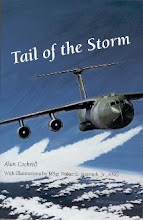Last night I relaxed with my two first officers and had some after dinner refreshments. All three of us had a robust repertoire of war stories that ran the gamut of night traps aboard a carrier, supersonic dogfights, dodging Saddam's missiles and funny tails about comrades in arms long ago. At length the topic turned—as it always seemed to do—to the future of the profession.
“The new bunch coming up...” I said after a lull, “...those who will replace us—they won't have these stories to tell.” They both nodded pensively. “Will it make a difference in the way they do this job?” They shrugged.
“I hope not,” one said, draining his glass.
The other said, “I've seen some pretty immature behavior among them.” I knew he was referring to the regional pilots. I had seen it as well. But I had also seen some exemplary behavior.
I told them about the ride on the jump seat I recently had on a 50-seater. After we blocked-in I gave my card to the young captain. “I like the way you fly,” I told him. He had handled mechanical problems, cranky passengers and threatening weather as well as I could have. “If you decide to apply to [my airline] let me know. I'd be honored to write you a recommendation.” He grinned and said he would be doing that soon. I was especially impressed that he had not asked me outright for a recommendation. He was the real thing.
The co-pilot turned and asked if he could have a card also. “You'll need to spend a couple of years in his seat first,” I said.
The long and short of it is there is good and bad in all groups, even our own, and like it or not the future of the airline pilot profession lies in the hands of those coming up without the benefit of experiences that generate the war stories.
I keep thinking about that as I wait now for the last few hours to tic by before we mount up for the dark 10 hour flight back north across Amazonia. We'll whip the big Pratts into a buzzing frenzy and heave down Sao Paulo's runway, 350,000 pounds of steel, fuel and flesh and pull off the pavement just a couple thousand feet before it ends.
We'll point the Boeing north and settle into our long high cruise listening to the hiss of the slip-stream, and the occasional rapid-fire transmission from a Portuguese controller. Our ears will tweak to his accent and we will do as he/she tells us. He will never demand much from us, though—only a frequency change or an estimate for the way point ahead.
We'll prop our eyes open and count the minutes until our assigned bunk time—three precious hours behind the heavy curtain on the last outboard first class seat. When my turn comes I'll snooze, listening to the slipstream, imagining the rotors out on the Pratts spinning at an unimaginable rpm—going on and on and on. What if one stops?
I'll feel a yaw and a deceleration. I'll fell the nose drop slightly as the two guys up front begin the driftdown to a sustainable single-engine altitude, usually around 24,000 feet. As I get out of the seat and make my way forward, I'll feel the plane bank to one side or another. I'll know the guys are turning toward a suitable divert airfield. As I brush past flight attendants with bulging eyes asking me what is happening, I'll know that the guys have chosen a good field to go to with adequate runways, approaches and weather. As I punch in the entry code on the cockpit door, I'll be certain they have completed the emergency checklists and notified our company Dispatch that we are in an emergency situation and diverting.
When the door opens I'll expect to see some unusual red and amber lights glowing and switches and handles in positions I only see in simulator exercises. The guy who let's me in will say, “Boss, I guess you know we've got a problem,” and I'll slip into my seat and they will fill me in on what happened and what they are doing, and I will relax and have some coffee because I'll be satisfied with their work.
Will that kind of trust persist as the years go by and the young guys who have never been supersonic, never dropped a bomb, never been upside down be able to provide it?
I'll be flying a rocking chair by then, but think they will.
“The new bunch coming up...” I said after a lull, “...those who will replace us—they won't have these stories to tell.” They both nodded pensively. “Will it make a difference in the way they do this job?” They shrugged.
“I hope not,” one said, draining his glass.
The other said, “I've seen some pretty immature behavior among them.” I knew he was referring to the regional pilots. I had seen it as well. But I had also seen some exemplary behavior.
I told them about the ride on the jump seat I recently had on a 50-seater. After we blocked-in I gave my card to the young captain. “I like the way you fly,” I told him. He had handled mechanical problems, cranky passengers and threatening weather as well as I could have. “If you decide to apply to [my airline] let me know. I'd be honored to write you a recommendation.” He grinned and said he would be doing that soon. I was especially impressed that he had not asked me outright for a recommendation. He was the real thing.
The co-pilot turned and asked if he could have a card also. “You'll need to spend a couple of years in his seat first,” I said.
The long and short of it is there is good and bad in all groups, even our own, and like it or not the future of the airline pilot profession lies in the hands of those coming up without the benefit of experiences that generate the war stories.
I keep thinking about that as I wait now for the last few hours to tic by before we mount up for the dark 10 hour flight back north across Amazonia. We'll whip the big Pratts into a buzzing frenzy and heave down Sao Paulo's runway, 350,000 pounds of steel, fuel and flesh and pull off the pavement just a couple thousand feet before it ends.
We'll point the Boeing north and settle into our long high cruise listening to the hiss of the slip-stream, and the occasional rapid-fire transmission from a Portuguese controller. Our ears will tweak to his accent and we will do as he/she tells us. He will never demand much from us, though—only a frequency change or an estimate for the way point ahead.
We'll prop our eyes open and count the minutes until our assigned bunk time—three precious hours behind the heavy curtain on the last outboard first class seat. When my turn comes I'll snooze, listening to the slipstream, imagining the rotors out on the Pratts spinning at an unimaginable rpm—going on and on and on. What if one stops?
I'll feel a yaw and a deceleration. I'll fell the nose drop slightly as the two guys up front begin the driftdown to a sustainable single-engine altitude, usually around 24,000 feet. As I get out of the seat and make my way forward, I'll feel the plane bank to one side or another. I'll know the guys are turning toward a suitable divert airfield. As I brush past flight attendants with bulging eyes asking me what is happening, I'll know that the guys have chosen a good field to go to with adequate runways, approaches and weather. As I punch in the entry code on the cockpit door, I'll be certain they have completed the emergency checklists and notified our company Dispatch that we are in an emergency situation and diverting.
When the door opens I'll expect to see some unusual red and amber lights glowing and switches and handles in positions I only see in simulator exercises. The guy who let's me in will say, “Boss, I guess you know we've got a problem,” and I'll slip into my seat and they will fill me in on what happened and what they are doing, and I will relax and have some coffee because I'll be satisfied with their work.
Will that kind of trust persist as the years go by and the young guys who have never been supersonic, never dropped a bomb, never been upside down be able to provide it?
I'll be flying a rocking chair by then, but think they will.
 |
| This is an incredible reflection of our plane, the picture taken
by yours truly in the left seat as we prepare for departure. |




I think that's your best post yet. Just perfect.
ReplyDeleteNice, Alan. Always enjoy your viewpoint and the way you write.
ReplyDeleteEnjoyed that pop!
ReplyDeleteNothing new under the sun:
ReplyDelete“Our youth now love luxury. They have bad manners, contempt for authority; they show disrespect for their elders and love chatter in place of exercise; they no longer rise when elders enter the room; they contradict their parents, chatter before company; gobble up their food and tyrannize their teachers.”
- Socrates.
Thanks for that, it was wonderful. A good friend of my oldest, went to UND after high school and flew the grid patterns and gained hours and learned patience. As he got further in his studies and gained more engines, he was a CFI. He got his multi rating and graduated. He stuck around a couple of years and instructed for the school, teaching all types of students. He moved to Seattle with his significant other who works for BNSF and got hired by a regional. He's flying an electric jet now and is based here in LAX. He loves his job, he loves the challenges and the opportunities his job affords. I think after watching him grow up, he is one of the good guys. I hope when he leaves this regional he will climb into the cockpit of a big gal and get into the right seat and learn from guys like you.
ReplyDelete